
new_insights_into_business_studen
.pdf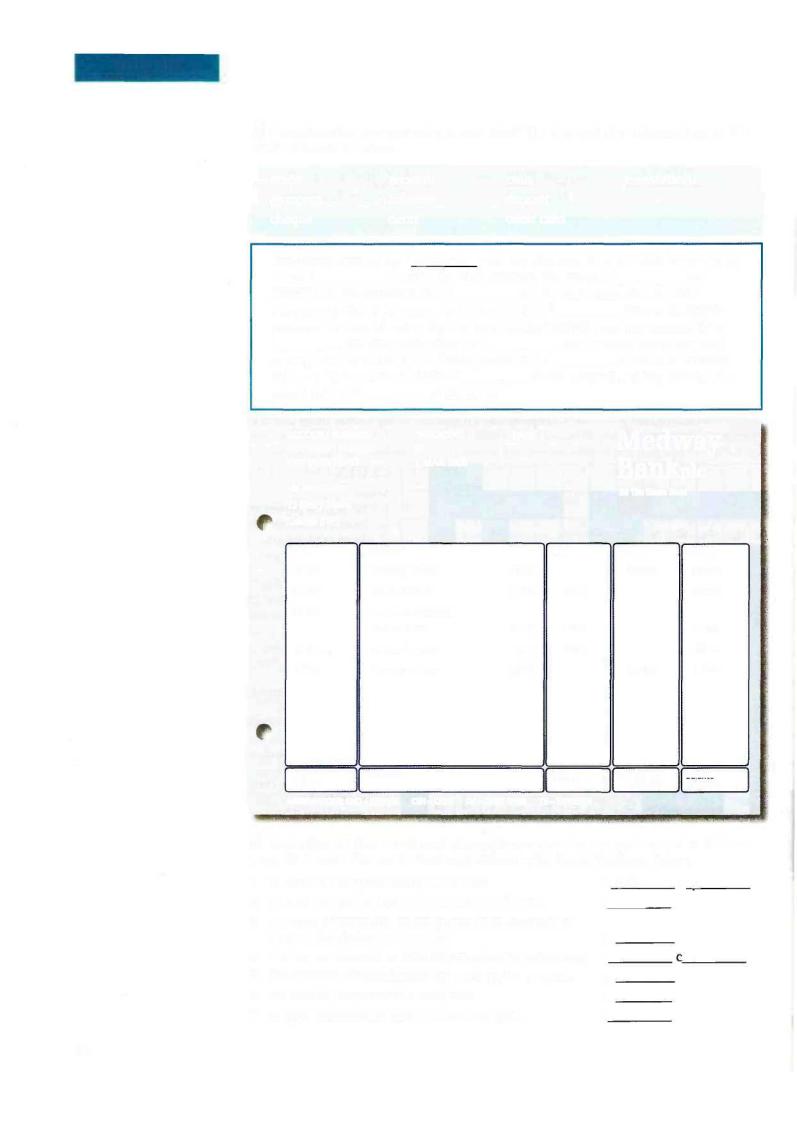
unit six
2 Complete the passage using words from the box and the information in the bank statement below.
credit |
account |
cash |
transactions |
payment |
balance |
deposit |
|
cheque |
debit |
debit card |
|
Jane Sadler opened her1 qccouoL with the Medway Bank on 28th January with
a cash 2 |
|
of £300. On 15th February she wrote a3 |
|
|
for |
|||
£53.25 and this appeared as a4 |
|
on the bank statement on 20th |
||||||
February. On 22nd February she took out £60 in 5 |
|
|
from a cashpoint |
|||||
machine. On the following day the bank debited £33.50 from her account for a
6 |
|
she had made using her7 |
|
|
. Her monthly salary was paid |
|||||
|
|
|
|
|
|
|
|
|
||
directly into her account and this appeared as a 8 |
|
|
of £802.20 on 26th |
|||||||
February. There were no further9 |
|
on her account and she finished the |
||||||||
month with a 10 |
|
of £955.45. |
|
|
|
|
||||
ACCOUNT NUMBER |
548634396 |
|
STATEMENT NUMBER |
01 |
|
STATEMENT DATE |
|
1 MAR 2000 |
Ms Jane Sadler |
|
|
75 Ebury Mews |
|
|
London SW5 |
|
|
Date |
Particulars |
|
PAGE 1 |
Medway |
|
|
Bankpic |
|
|
53 The Mews Road |
|
|
London |
|
|
L 3 4 P Y6 |
|
Debits |
Credits |
Balance |
28 Jan |
Opening deposit |
(CSH) |
|
300.00 |
300.00 |
20Feb |
Cheque 000001 |
(CHQ) |
53.25 |
|
246.75 |
22Feb |
AutobankAB69301 |
|
|
|
|
|
Oxford Street |
(CSH) |
60.00 |
|
186.75 |
23Feb |
Maitland and Co |
(DC) |
33.50 |
|
153.25 |
26Feb |
Bennet and Sons |
(CSH) |
|
802.20 |
955.45 |
Date |
Particulars |
Debits |
Credits |
Balance |
IMar |
|
146.75 |
1102.20 |
955.45 |
ABBREVIATIONS: CHQ-CHEQUE |
CSH-CASH DC - DEBIT CARD TR-TRANSFER |
|
|
|
3 Underline all the words and expressions related to computers in the text on page 58. Match the words and expressions with the definitions below.
1to make a computer ready to be used
2a small computer that you can carry with you
3to move information or programs from one part of a computer system to another
4the key words used to find information in a database
5the analysis of information by a computer program
6the sets of programs in a computer
7 to type information into a computer again
b oofc- |
u P |
||
1 |
|||
|
|||
|
|
|
|
d_ |
|
||
s |
|
||
P- |
|
||
s_ |
|
||
r |
|
||
60
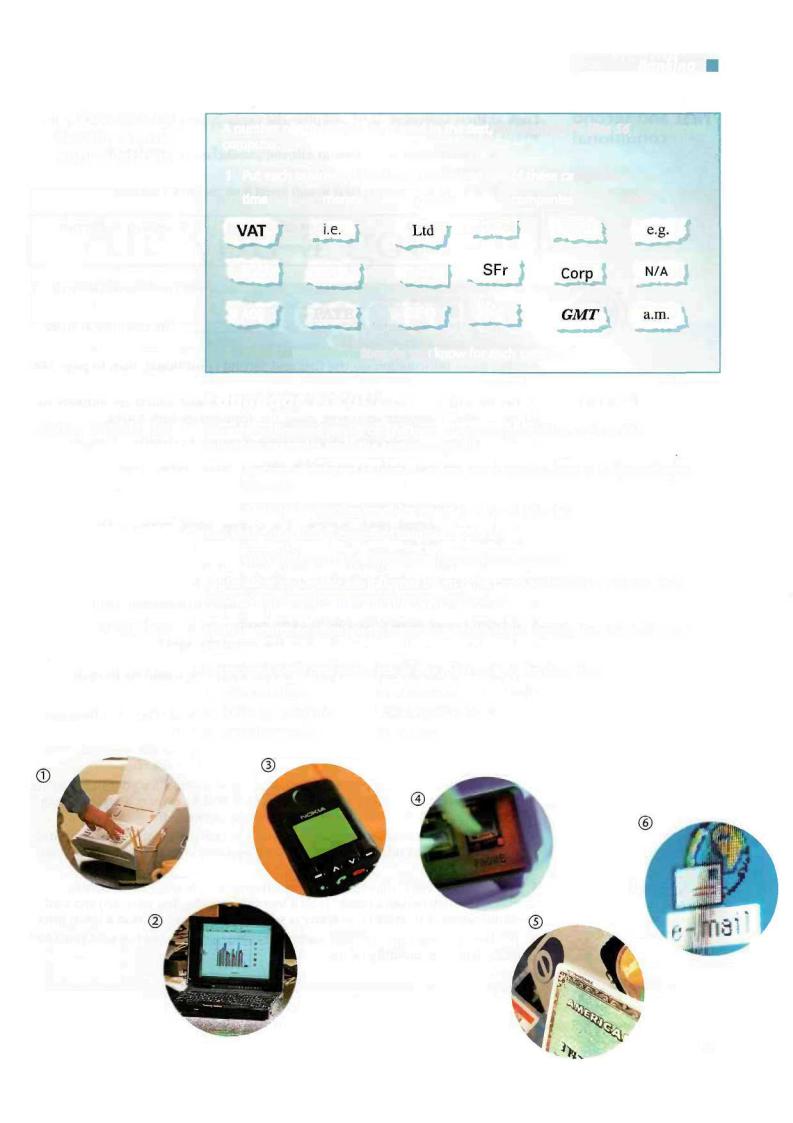
Vocabulary development: abbreviations
Allow, enable, let
Practice
Banking
A number of abbreviations are used in the text, for example PC (line 56) for personal computer.
1 Put each business abbreviation below into one of these categories,
time |
money |
people |
companies |
other |
|
|
|
p.a. |
] |
asap |
|
I OU |
M D |
ACM \ |
|
|
|
AOB |
P A Y E |
CEO |
pic |
|
|
2 What other abbreviations do you know for each category?
Language Focus
The verbs allow and enable can be used to express possibility. Look at the following examples from the text on page 58.
Features maintained in yourPC allowyou to restrict access to designated users,
(line43)
The CHAPS function enables you to send funds, (line 59)
The same idea can be expressed using the verb let.
HOBS lets yougroup informationfromdifferentaccounts.
While allow and enable are followed by an object and an infinitive with to, let is followed by an object and an infinitive without to.
Write a sentence about each invention using allow, enable, let. Use each verb twice.
Example: A credit card allows you to buy goods andpay for them later.
1 |
A fax machine |
4 |
A modem |
2 |
A laptop computer |
5 |
A credit card |
3 |
A mobile phone |
6 |
61
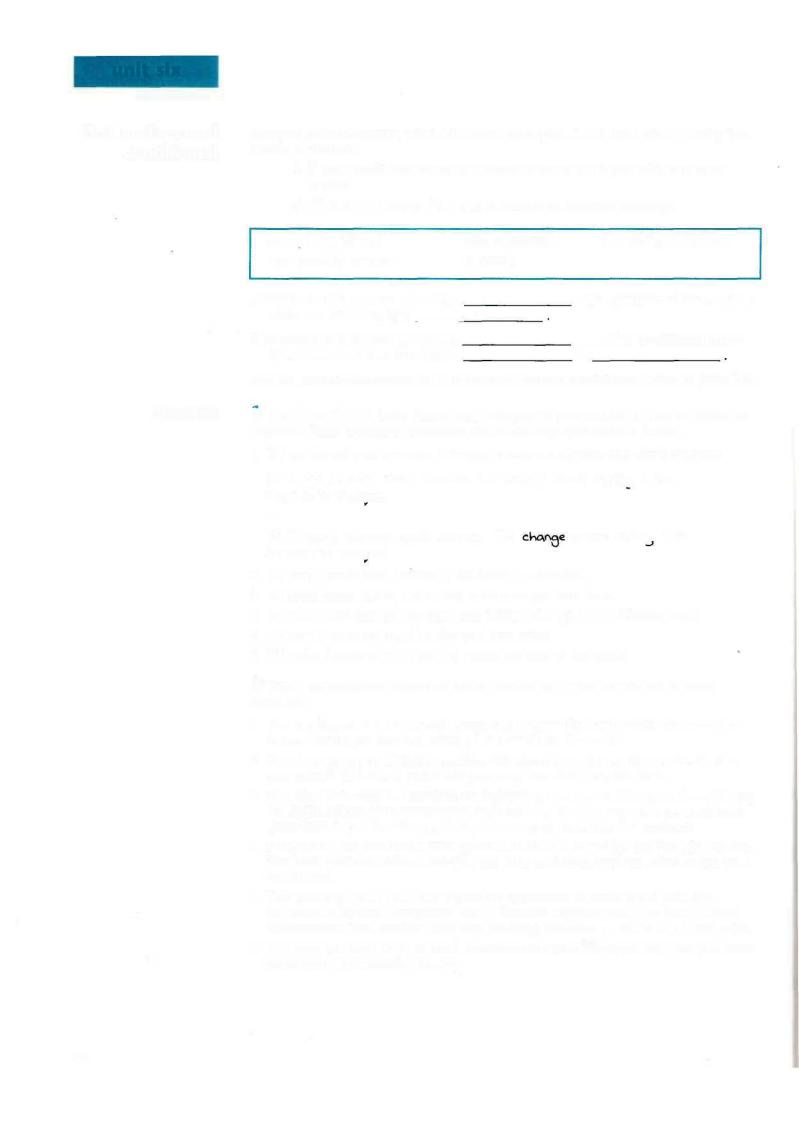
unit six
First and second conditional
Practice
Look at these sentences, then complete the explanations that follow, using the words in the box.
AIfyou transfer your money to a deposit account, you'll (you will) earn more interest.
BIfI had more money, I'd (I would) invest it on the Stock Exchange.
|
second conditional |
first conditional |
is unlikely to happen |
||
|
may possibly happen |
is unreal |
|
|
|
1 |
Sentence A is an example of the . |
. The conditional clause (if...) |
|||
|
refers to a situation that |
|
|
|
|
2 |
Sentence B is an example of the |
|
|
. The conditional clause |
|
|
(if...) refers to a situation that _ |
|
or |
||
•• For more information on the first and second conditional, turn to page 166.
I Decide which of these things may happen to you and which are unlikely to happen. Write complete sentences using the appropriate verb forms.
1 If / go abroad next summer / change / some money into traveller's cheques.
If I go obfoc\d t\e.x*L Suwoer I'M cWcv\ge some. tr\or\etj Lt\Lo traveller's cheques
or
If I loervfc. |
abroad r\e>cL SufY\cr\er I'd |
SOrr\e. rr\or\eu Lftfc-O |
traveller's |
cheques |
|
2If / lose / credit card / inform / the bank immediately.
3If / need some money / ask / the bank manager for a loan.
4If / find / mistakes on my bank statement / change / to a different bank.
5If / earn / more money / be able to / save more.
6If / order / chequebook / get / it before the end of the week?
2 Read the problems below. In pairs, discuss what you would do in each situation.
1You have spent the last month preparing a report for head office. You have just learned that your boss has taken all the credit for the work.
2Your boss gave you a highly confidential report to read over the weekend. Now you cannot find it and you think you may have left it on the train.
3You have been sent to negotiate an important new contract for your firm. During the negotiations your counterpart makes it clear that he expects a personal cash contribution (a bribe) from you if your company is to win the contract.
4In your CV you lied about your qualifications in order to get the job you wanted. You have just been offered the job, but your new employer has asked to see your certificates.
5Two years ago your company signed an agreement to become the exclusive importer of kitchen equipment from a Swedish supplier. You have just received confirmation that another company is selling the same products at a lower price.
6You have just seen in your bank statement that your employer has paid you £500 more than your monthly salary.
62
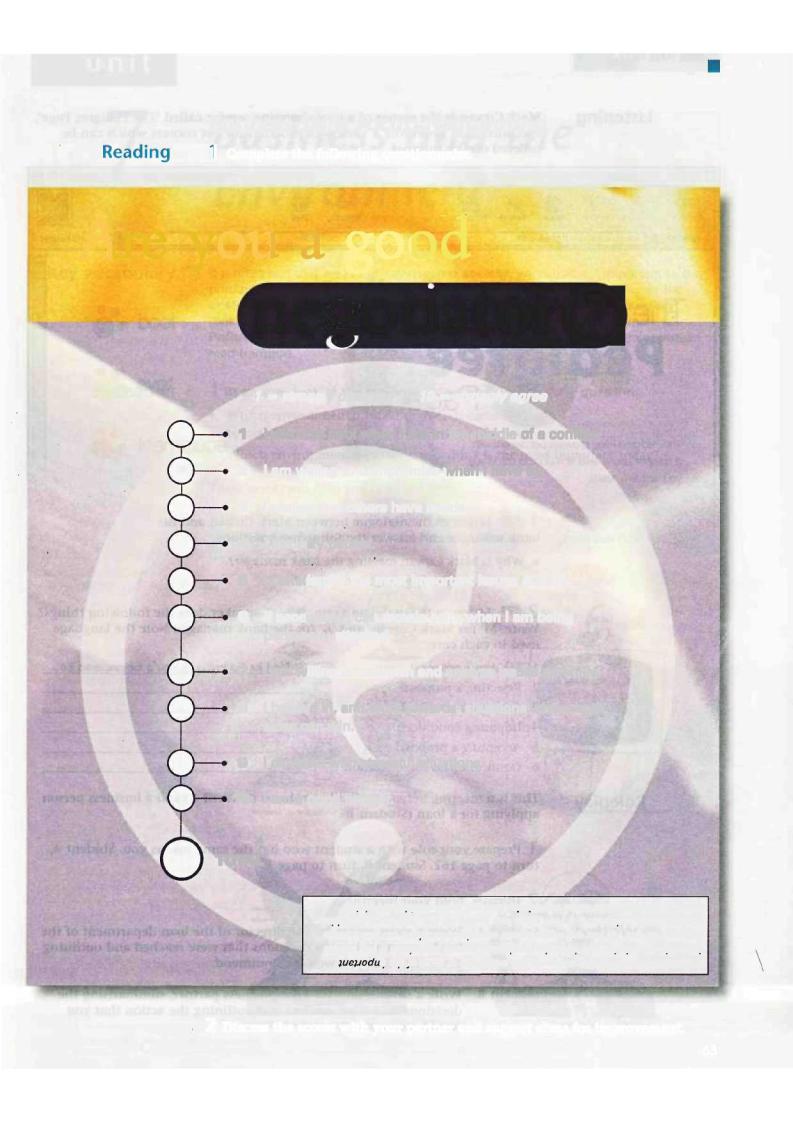
Banking
BusinessSkillsFocus:Negotiating
I Complete the following questionnaire.
Are you a good
neeotiatorQ
1 = strongly disagree 10 = strongly agree
1 I can stay cool when I am in the middle of a conflict.
2I am willing to compromise when I have to.
3I realise that others have needs.
4I am very patient.
5I can identify the most important issues quickly.
6If necessary, I can remain calm when I am being personally attacked.
7I am willing to research and analyse issues carefully.
8I believe in, and work towards, situations where both sides can win.
9I can deal with stressful situations.
1O I am a good listener.
TOTAL
•BUIUIBJI /euoippps auios jaB pus uo/i&toBau tnoqe sapnt/ye moA p au/os jjuiujajoj}UBMABLUnoA'09Mo/aqSBMajoosjnoAjy•aAOJduii0}paaunoAje</J saajB aiuos aje ajauj jnq jo}Bi}oBau pooB e ayeiu //IM noA 'g£ pus 09 uaa/vyaq pajoos noA^i -jo)Bi}oBau pooB e p sBuiyeuu aut 3ABU pue uoiiBiioBau w sanssi iiaui1.0JSOUIj.oaje/v\eBJBnoA'aAoqeJO08SBMajoos/e}ojjnoAjy
2 Discuss the scores with your partner and suggest areas for improvement.
63
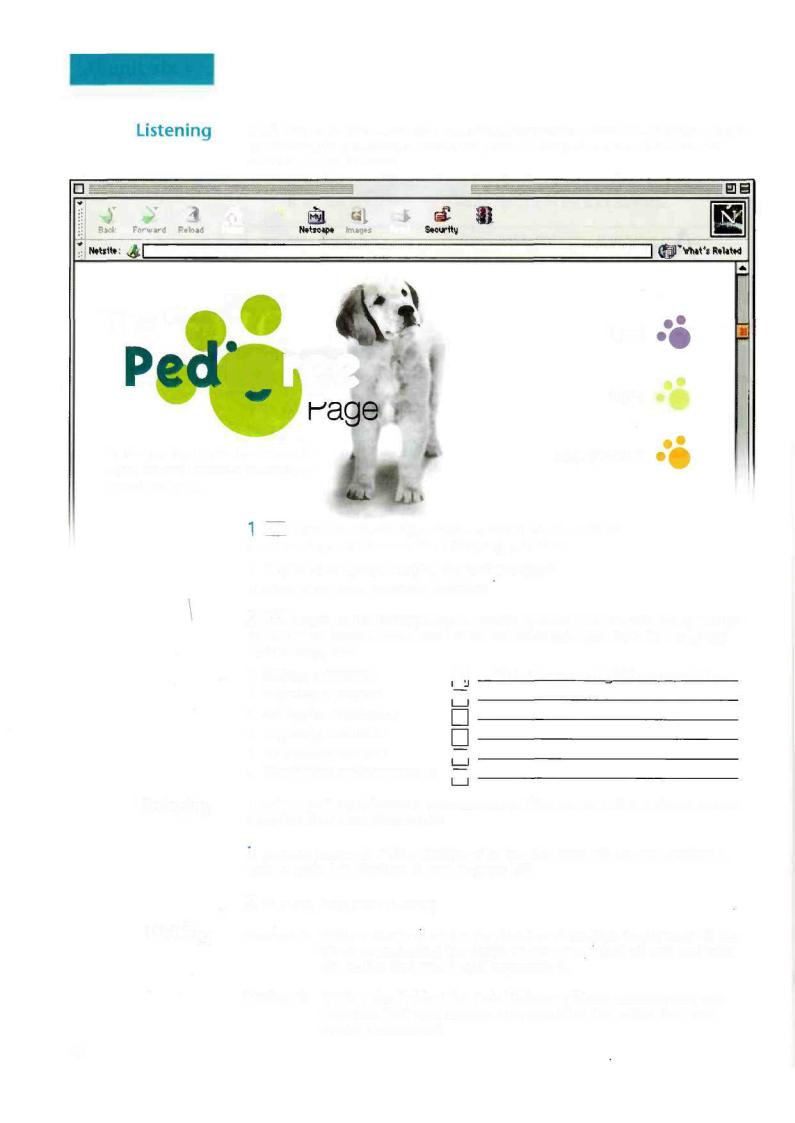
unit six
Mark Cowan is the owner of a new shopping service called 'The Pedigree Page', specialising in providing a variety of products for pet owners which can be ordered on the Internet.
Horn* |
S»areh |
Step |
http//www.pedigree.net
The
food
icrree |
toys |
r^_ |
|
The Pedigree Page provides pet owners with |
equipment |
a comprehensive selection of products to suit |
|
your animal's needs. |
|
Roleplay
Writing
I 1^1 Listen to the dialogue between Mark Cowan and his bank manager and answer the following questions.
aWhy is Mark Cowan meeting the bank manager?
bWhat is the bank manager's response?
2 HH Listen to the dialogue again. Which speaker does the following things? Write 'M' for Mark Cowan, and 'B' for the bank manager. Note the language used in each case.
1 |
Making a proposal |
I ... I'd >lk.e bo kncxo Lf nou'd be prepared bo... |
f^Tn |
||
2 |
Rejecting a proposal |
I 1 |
3Asking for clarification
4Imposing conditions
5 |
Accepting a proposal |
I |
I |
6 |
Confirming an interpretation |
I |
I |
This is a meeting between a bank employee (Student A) and a business person applying for a loan (Student B).
I Prepare your role with a student who has the same role as you. Student A, turn to page 162. Student B, turn to page 157.
2 In pairs, hold your meeting.
Student A: Write a short report for the director of the loan department of the bank, summarising the decisions that were reached and outlining the action that you would recommend.
Student B: Write a short report for your business partner, summarising the decisions that were reached and outlining the action that you would recommend.
64
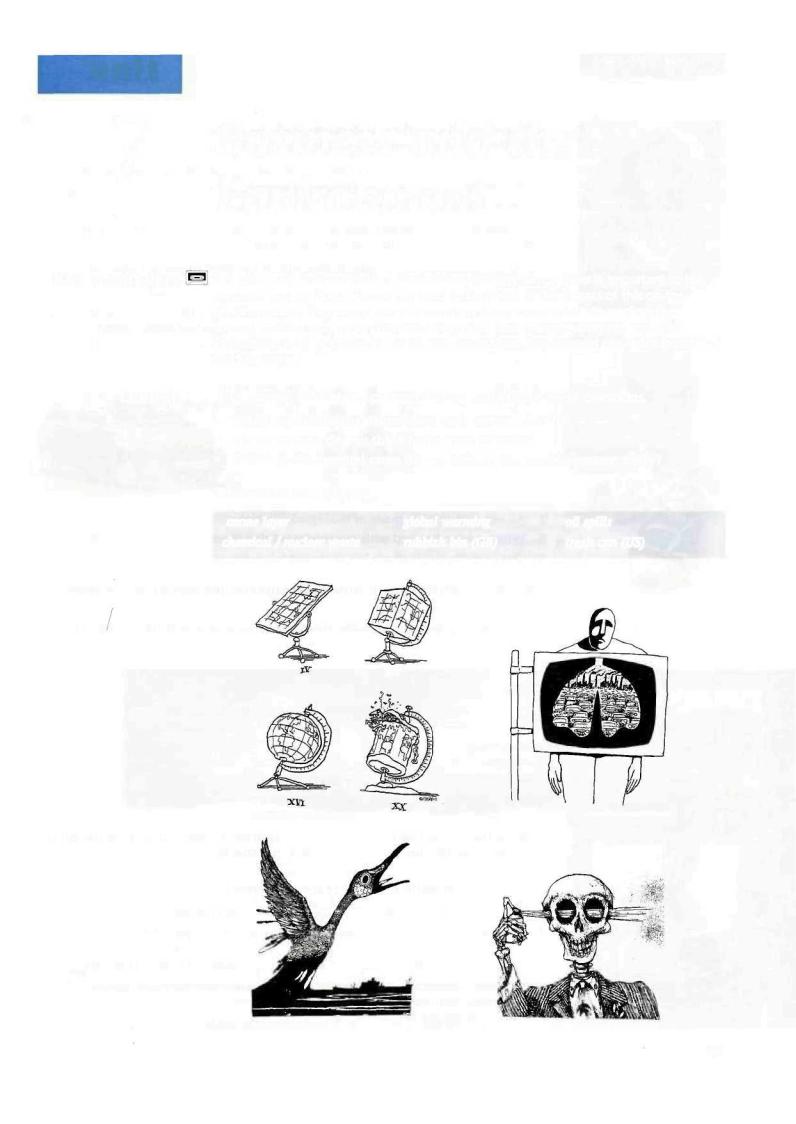
unit
7
Key vocabulary
Lead-in
Businessandthe
Environment
It is often said that we live in a consumer society; we consider it important to buy products and services. Companies need to be aware of the impact of this on the environment, the natural world around us. Many companies use packaging (boxes, bottles, etc.) which has been recycled, that is made using old materials. Pollution, such as smoke in the air, can be reduced if companies use trains instead of road transport.
1In groups, look at the cartoons below and discuss these questions.
•Which environmental threat does each cartoon refer to?
•Which cartoon do you think is the most effective?
•Which environmental cause do you think is the most important today?
These words will help you. |
|
|
ozone layer |
global warming |
oil spills |
chemical / nuclear waste |
rubbish bin (GB) |
trash can (US) |
XXY
Palomo/LaJornada/MexicoCity |
Javad/Fokahyoun/Teharan |
Ewk/AltonbladeVStockholm |
Cummings/FreePress/Winnipeg |
65
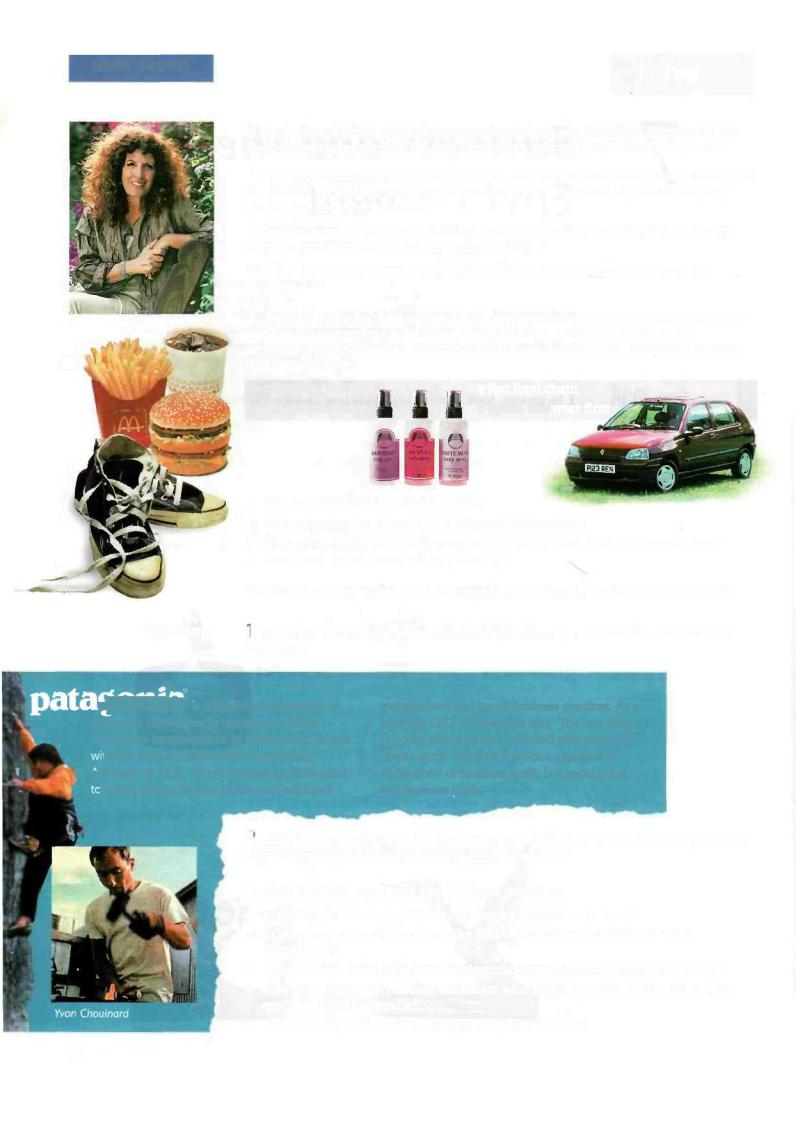
unit seven
2 In groups, discuss these statements made by Anita Roddick, founder of The Body Shop International. Do you agree with any of them? Why? Why not?
'A good business should be part of society, and you have to have pride in what you do. There's no pride in making millions of pounds, but there is pride in helping people and the environment.'
'The idea now is global responsibility. Businesses are the true planetary citizens, they can push frontiers, they can change society.'
'In the next decade, environmentalism will be the most important issue for business.'
3 As consumers become increasingly concerned about the environment, more and more companies claim to be producing 'environmentally-friendly' products. Read the claims below and match each one to the company that you think made it.
a |
cosmetics firm |
a |
fast food chain |
a |
car manufacturer |
a |
sports footwear firm |
1'We provide refills for all our bottles.'
2'All our packaging is made of biodegradable materials.'
3'When you've finished with our products bring them back, we recycle them.'
4'Our latest model is much less polluting.'
What other companies with environmentally-friendly policies do you know?
Reading I Read the text below and write three questions you would like to ask about Patagonia.
a ^ ^ J M l l C l is a Califomian company. Its corporate culture has its roots in the 1960s Califomian counterculture of climbers and surfers
th the ethic of radical environmentalism. Although its CEO, Yvon Chouinard, is dedicated
i social change he also insists on disciplined
management and sound business practices. As a previous CEO of Patagonia said, 'The one thing I'm clear about is that Chouinard demands 10% pretax profit.' For him, it is not a question of social good or business profit, but social good and business profit.
2. Read the text opposite and see if you can find the answers to your questions. Can you guess the answers to your other questions?
3 Read the text again and answer these questions.
1According to the text, why are Patagonia's customers so loyal?
2In what ways does Patagonia make efforts to explain its products' 'earthfriendliness'?
3What is the overall objective of Patagonia's environmental education policy?
4How does Patagonia reassure customers who might question their claims to be environmentally-friendly?
5How do customers react to Patagonia's grants projects?
66
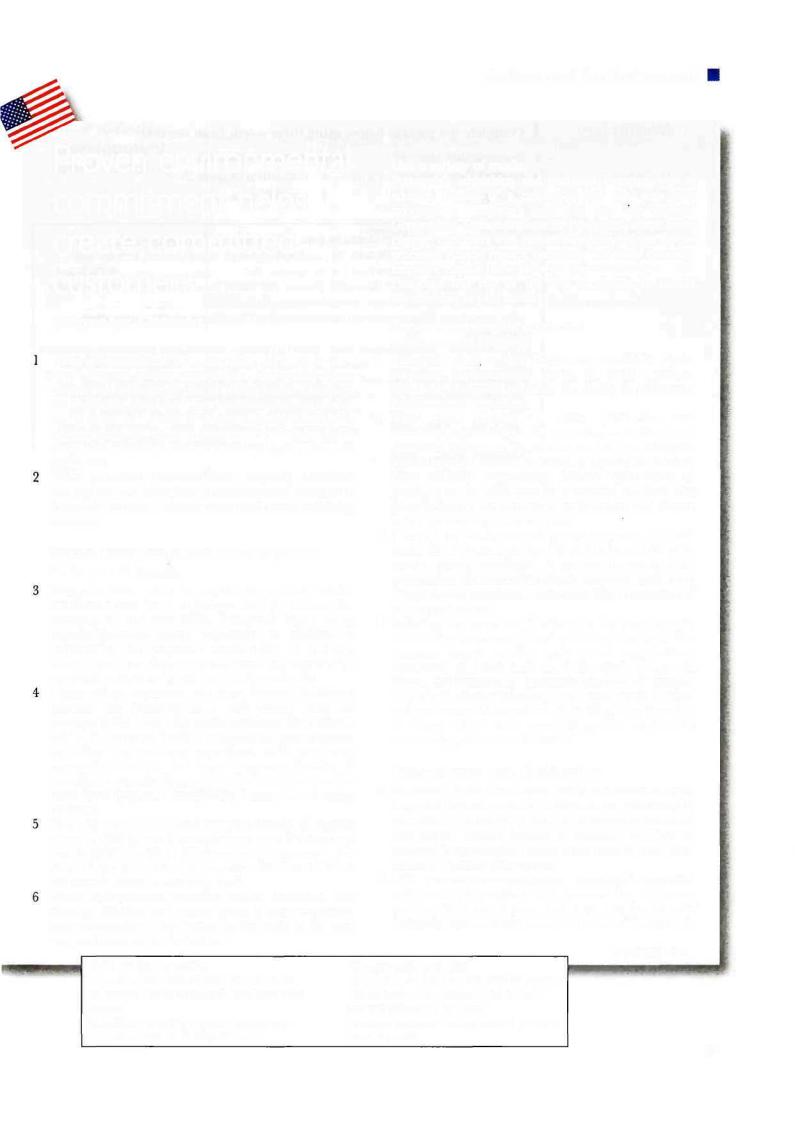
Business and the Environment
Proven environmental commitment helps create committed customers
Jacquelyn Ottman
Use a variety of media.
7 Patagonia's advertising and company literature aim to educate. Instead of a catalog packed only with sales informationj Patagonia's catalog is more like National Geographic. Demonstrations in Patagonia's retail stores engage* customers with interactive displays of the earth's processes. Annual reports, pamphlets and other company literature explain new ideas in environmentalism. And Patagonia was one of the first companies to discuss sustainability in paid media.
Demonstrate tangible corporate environmental progress.
When self-proclaimed Tatagonics' dial up Patagonia, they know they will receive more than a high-quality fleece anorak or a waterproof pair of hiking boots. Thanks to the California-based retail firm's outdoor clothing catalog and its exemplary method of communicating its corporate environmentalism, customers are not only knowledgeable about the company's environmental progress, they are loyal*, too.
When purchasing products from Patagonia, customers also buy into a commitment to environmental restoration. Patagonia's example demonstrates good green-marketing strategies.
Educate consumers on environmental product attributes and benefits.
Patagonia takes pains to explain its products' earthfriendliness and show customers the big picture. For example, in the mid-1990s, Patagonia began using organically-grown cotton exclusively. In addition to highlighting the 'osganic* merchandise in product descriptions in catalogs, essays explained why organicallyproduced products are environmentally preferable.
Other essays expanded the issue beyond individual products and processes. In a 1996 catalog essay, for example, CEO Yvon Chouinard explained the rationale behind the company's switch to organically-grown cotton, including the problems associated with producing conventional cotton, the larger long-term benefits of investing in organically-grown products and the need to think about long-term sustainability issues when choosing products.
One might assume that explaining the benefits of organic cotton in catalogs was a strategic move, since the company had to justify the $2 to $10 premium per garment. But other essays, for instance, addressed environmental issues not directly linked to company profit.
Broad environmental education teaches consumers that although thinking and buying green is more expensive, environmentalism is less taxing on the earth in the long run, and therefore, on individuals.
8Patagonia realizes that customers sometimes doubt corporate environmental claims. To avoid consumer backlash*, Patagonia publishes the results of its internal environmental assessment.
9This report reviews all office, production and merchandising activities and uncovers opportunities to cut waste and reduce energy. Readers can see how Patagonia tries to conduct business in a socially responsible manner, from choosing long-lasting efficient light bulbs to providing on-site child care for employees' children. The grounds around the company's headquarters even feature edible landscaping - banana trees.
10 Through an environmental grants program, dubbed* Earth Tax, Patagonia pledges 1 % of its sales or 10% of its pre-tax profit, whichever is greater, to small, local preservation and restoration efforts. Through* April 1997, Patagonia had contributed more than $8m to hundreds of such organizations.
11 Believing that grass roots* efforts do the most to raise community awareness of local problems, the Earth Tax program targets smaller grass roots organizations committed to issues such as biodiversity*, old-growth forests, environmentally preferable methods of resource extraction*, alternative energy and water, social activism and environmental education. By funding more than 350 of these efforts each year, Patagonia helps raise community awareness nationwide.
Empower consumers to take action.
12 An annual Earth Tax Report invites customers to apply for grants for local projects. Participants are quick to apply and inform the company about environmental successes. One recent catalog featured a customer sporting an insulated Patagonia guide jacket as she rescued a calf born during a Colorado snow storm.
13 With powerful communication, meaningful corporate environmental progress and avenues for consumer activism, it is no wonder that even skeptics become Patagonia customers and customers become Tatagonics'.
Marketing News
'loyal: always supporting
'organic made without artificial chemicals
*to engage s.b.: to attract s.b. and keep their interest
*a backlash: a strong reaction against s.th.
'to dub: to give an 'unofficial' name
'through (US): until (GB)
'gross roots: at the level of ordinary people
'biodiversity: many different plants and animals existing in one area
'resource extraction: taking natural products from the earth
67
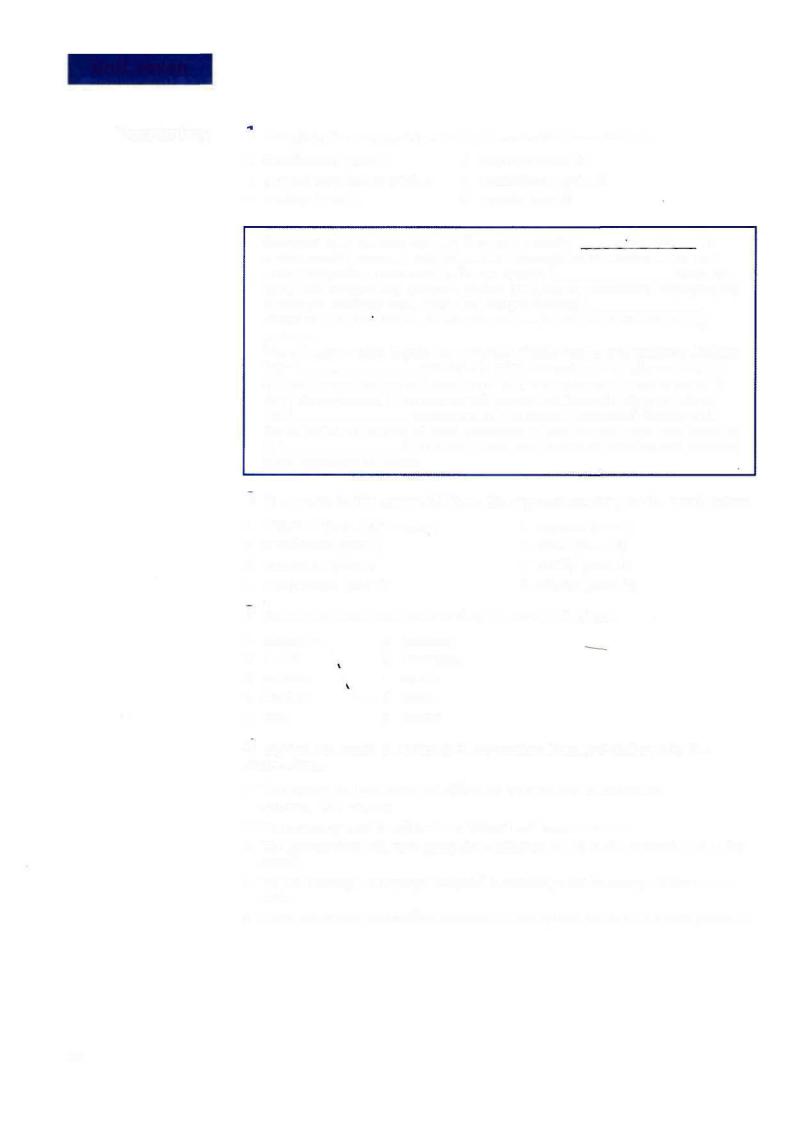
unit seven
Vocabulary
I Complete the passage below using these words from the text.
a |
sustainability {para 4) |
|
|
|
d |
empower (para 12) |
|
|
|||||
b |
product descriptions (para 3) |
e |
commitment (para 2) |
|
|
||||||||
c |
catalogs (para 3) |
|
|
|
e |
organic (para 3) |
|
|
|||||
|
|
|
f |
|
|
||||||||
|
Patagonia is an outdoor clothing firm with a strong 1 eoiwvw_fc.ry\er\L |
to |
|||||||||||
|
environmental causes. It sells its products through retail outlets and by mail |
||||||||||||
|
order. Patagonia is renowned for its spectacular 2 |
|
which are |
||||||||||
|
filled with unusual and dramatic photos (all taken by customers) displaying the |
||||||||||||
|
clothing in exciting ways. They also contain detailed 3 |
|
|
||||||||||
|
which include definitions of materials and explanations |
of manufacturing |
|
||||||||||
|
processes. |
|
|
|
|
|
|
|
|
|
|||
|
The company makes jackets from recycled plastic bottles and produces clothing |
||||||||||||
|
from 4 |
|
|
|
materials. It offers courses to its employees on non- |
||||||||
|
violent |
demonstrations and even pays bail for employees who get arrested. It |
|||||||||||
|
also donates money to environmental groups and generally supports efforts |
||||||||||||
|
that 5 |
|
|
consumers to take action. Patagonia's strategy isn't |
|||||||||
|
just to give away money to good causes but to pioneer new, long-term practices |
||||||||||||
|
of 6 |
|
in business, prove their economic viability and persuade |
||||||||||
other businesses to follow.
2! Find words in the text which have the opposite meaning to the words below.
1 |
imperfect (para 1) ex.emptc\ry |
5 |
separate (para 5) |
|||
2 |
uninformed (para 1) |
|
6 taken (para 10) |
|||
3 |
innovative (para 4) |
|
7 locally (para 11) |
|||
4 |
uncalculated (para 5) |
|
8 |
failures (para 12) |
||
3 |
Match the nouns and verbs as they are used in the text. |
|||||
1 |
address |
^ |
a |
business |
|
|
2 |
doubt |
\ |
b |
awareness |
|
|
3 |
publish |
\ |
c |
results |
|
|
4 |
conduct |
|
V^_ d |
issues |
|
|
5 |
raise |
|
e |
claims |
|
|
4 Replace the words in italics with expressions from Vocabulary 3 in the correct form.
1The speaker will talk about the difficulties we are likely to encounter, address the LSSueS
2The company runs its affairs in an ethical and honest manner.
3The government will make public the conclusions of the environmental study next month.
4We are running a campaign designed to increase public knowledge of the current crisis.
5Many consumers don't believe statements made by companies about their products.
68
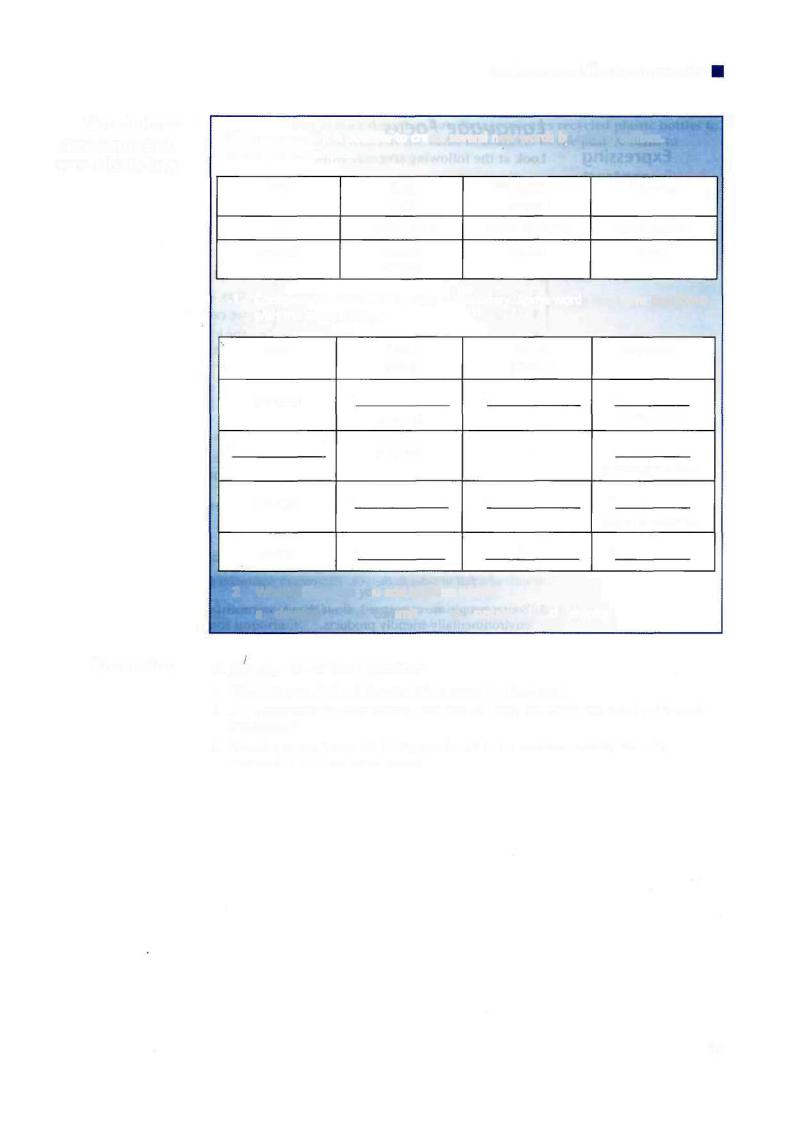
Vocabulary development: word building
Discussion
Business and the Environment
With some words it is possible to create several new words by adding suffixes. Look at these examples.
Verb |
Noun |
Noun |
Adjective |
|
(idea) |
(person) |
|
- |
environment |
environmentalist |
environmental |
activate |
activism |
activist |
active |
|
activity |
|
|
1 Complete the table below, using a dictionary. Some words may have two forms with the same spelling.
Verb |
Noun |
Noun |
Adjective |
|
(idea) |
(person) |
|
produce |
a |
b |
c |
|
|
|
|
|
(efficiency) |
|
(making a lot) |
d |
progress |
- |
e |
|
|
|
(supporting new ideas) |
manage |
f |
S |
h |
|
|
|
(relating to senior staff) |
direct |
i |
j |
k |
|
|
2 What suffixes can you add to these words?
a develop |
b commit |
c sustain |
d employ |
In groups, discuss these questions.
1 What do you think of Patagonia's approach to business?
2Arc consumers in your country concerned about the environmental policies of businesses?
3Would you pay more for things produced in an environmentally-friendly manner? If so, how much more?
69
